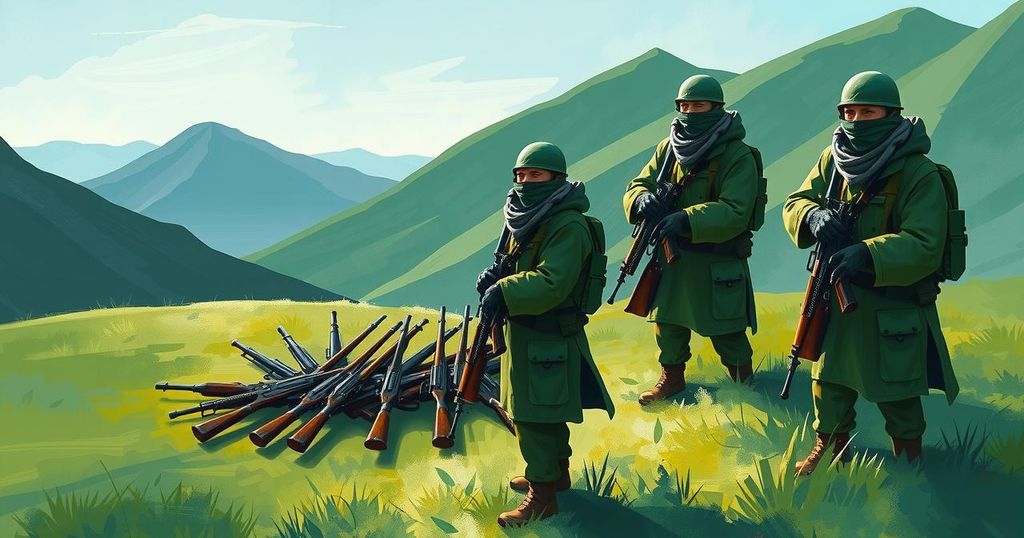What to Know About the Latest Effort to End Turkey’s 40-year Kurdish Conflict

- Kurdish fighters in Iraq burn weapons in symbolic disarmament gesture.
- Abdullah Ocalan calls on PKK to disband and cease hostilities.
- This marks a significant shift in Turkish and Kurdish relations.
- Turkey has a history of failed peace initiatives with the PKK.
- Concerns persist that splinter groups may arise from disbanding efforts.
Symbolic Gesture Marks First Step Towards Peace Efforts
Kurdish Fighters Take First Step in Disarmament In a significant development in the Turkish-Kurdish conflict, about 30 Kurdish fighters from the Kurdistan Workers’ Party, also known as PKK, burned their weapons in a cauldron in northern Iraq last Friday. This act symbolizes a foundational step in an ongoing effort to resolve one of the longest-running insurgencies in the Middle East. The ceremony was notably marked by the participation of 15 women fighters, indicative of the diverse makeup of the group. The gesture aligns with ongoing peace efforts which have been re-ignited recently as Abdullah Ocalan, the PKK’s imprisoned leader, urged his faction towards disarmament in a message shared earlier this week. The call for disarmament comes as Turkish officials cautiously welcome this initial move, yet concerns linger about what this means for the broader Kurdish militant presence, particularly in Syria.
A Deep Dive into PKK’s History and Leadership
Understanding the PKK and Their Goals The PKK has been engaged in conflict against Turkey since 1984, initially seeking to carve out an independent state for Kurds in southeastern Turkey. Over the decades, their goals shifted toward advocating for greater autonomy and rights for the Kurdish populace within Turkey. This armed struggle has extended into neighboring Iraq and Syria and has tragically cost tens of thousands of lives. Labelled a terrorist organization by Turkey, the US, and the EU, the PKK’s current situation appears complex. Ocalan’s journey, from founding the PKK as a student activist to imprisonment since 1999, showcases the challenges faced by the movement. His role remains pivotal, as messages from him resonate with Kurds, not just in Turkey but also in Iraq and Syria. His call for disbandment this month could mark a crucial turning point in this protracted conflict where many have sought peace, albeit unsuccessfully.
Prospects for Peace Amid Historical Tensions
Political Shifts and the Future of the Peace Process Just recently, Turkish politician Devlet Bahceli, a known ultranationalist ally of President Erdogan, made a surprising suggestion: Ocalan might be granted parole if he disavows violence. This signals a notable departure from Bahceli’s historically hardline stance. In a move further aligning with Ocalan’s call, the PKK announced a unilateral ceasefire in March, eventually leading to this week’s decision to disarm. However, while progress has been acknowledged, uncertainties loomed over what kinds of concessions the Kurdish factions might secure in exchange. Concerns are rife that splinter groups could emerge from the PKK, potentially leading to continued acts of hostility. Just after Bahceli’s announcement, the PKK claimed responsibility for an attack on a Turkish aerospace company, highlighting the fragility of this peace process. It is clear that while the initiatives point towards potential reconciliation, the path ahead remains fraught with challenges and historical distrust.
This latest effort to broker peace in the long-standing Kurdish conflict involves important symbolic gestures, calls for disarmament from the PKK’s leadership, and politically charged dialogues that could reshape Turkey’s socio-political landscape. However, with historical precedents in mind, the effectiveness and sustainability of this initiative will depend heavily on mutual trust, practical concessions, and addressing the aspirations of the Kurdish people.






